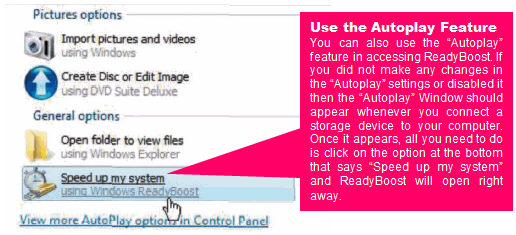
- What is readyboost on my usb portable#
- What is readyboost on my usb Pc#
- What is readyboost on my usb windows 7#
Windows Vista must have Service Pack 1 to support exFAT.

What is readyboost on my usb Pc#
It's due to low quality chips in theĪ PC usually have several USB ports in the front, and several in the back. MiB per second, while required is 2.5 MiB. It seems my USB drive's access time is not fast enough. > Running: Storage Performance Assessment via Profiling v1.0.0.0 '-write -ran -ransize 524288 -drive J' > Running: Storage Performance Assessment via Profiling v1.0.0.0 '-read -ran -ransize 4096 -drive J'Ĭ:\Windows\system32>winsat disk -write -ran -ransize 524288 -drive J > Running: Feature Enumeration v1.0.0.0 '' All rights reserved.Ĭ:\Windows\system32>winsat disk -read -ran -ransize 4096 -drive J Here's my output: Microsoft Windows Ĭopyright (c) 2006 Microsoft Corporation. In search field, type “cmd”, then right click on the “cmd.exe” then choose “Run as administrator”. To test random reads (4096 for 4 KB): winsat disk -read -ran -ransize 4096 -drive ‹driveletter›įor random writes (524288 for 512 KB): winsat disk -write -ran -ransize 524288 -drive ‹driveletter›

The Command Prompt must be run with administrative privileges, otherwise test results will not be visible after testing.
What is readyboost on my usb windows 7#
Windows Vista and Windows 7 include a command-line utility called "winsat" to test the performance of random read and write speeds. You can right click on the drive and choose Properties, under ReadyBoost tab, to see if ReadyBoost is active for that drive. The device must be capable of 2.5 MB/s read speeds for 4 KB random reads spread uniformly across the entire device, and 1.75 MB/s write speeds for 512 KB random writes spread uniformly across the device.


What is readyboost on my usb portable#
It works by using flash memory, a USB flash drive, SD card, CompactFlash or any kind of portable flash mass storage system as a cache. ReadyBoost is a disk cache component of Microsoft Windows, first introduced with Microsoft's Windows Vista in 2006 and bundled with Windows 7 in 2009. Basically, if you have any flash drive on your system (such as USB drive), the OS will use it as a cache system to speed up any file access operations.


 0 kommentar(er)
0 kommentar(er)
